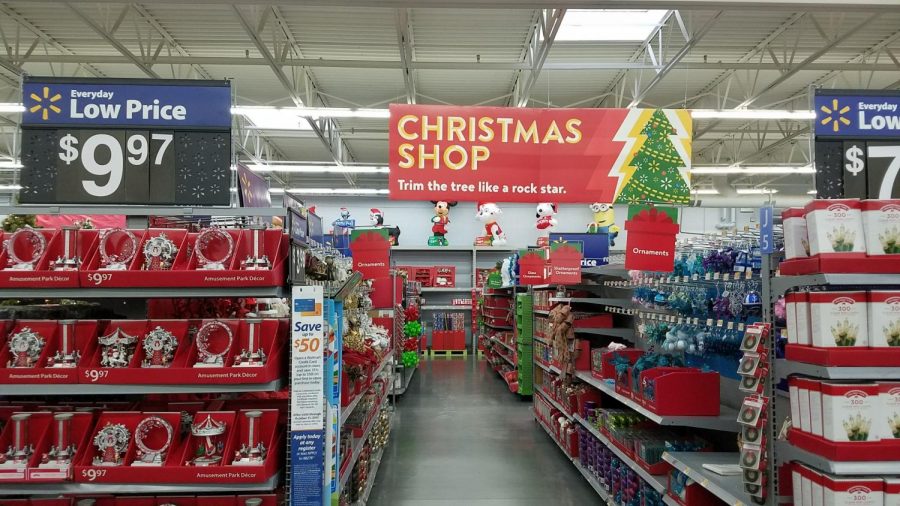Why Christmas arrives earlier every year
Used with permission from Ben Friedman
A Christmas display at Lowe’s inserts itself in the midst of the Halloween season.
October 16, 2017
Mid July does not ring the Christmas cheer bell in many people’s’ minds, especially the blazing heat, inflatable floaties, and plentiful supply of Sno-Kones on the coasts. Though, for many retailers, the Utopian life of “Christmas every day” is too attractive and lucrative to abandon. It’s common for the average consumer to see stores advertise their happy holiday items in the month of October and earlier. Even in Cumming, the local Target and Walmart are ready for shoppers to set their gifts beneath their Christmas tree. This early preparation is known as Christmas Creep, a phenomenon where Christmas takes on more than its fair share of time on store shelves. Typically, it begs the argument about when Christmas should be celebrated in homes: at the start of December, or a week or two beforehand?
The extent of Christmas’ life in a person’s home is a good argument but consider what retailers could gain otherwise. Stores sell this merchandise during months when people aren’t typically concerned with Christmas. Usually, people do not think of Christmas much earlier than before Thanksgiving, but a handful of people are beginning to see the advantages of Christmas Creep. Customers no longer feel rushed into buying decorations and presents, and they can plan out their budget as time passes. Meaning, customers could save more money and spend less on the days where these items could leave families relying on leftovers for much longer than they’d like. Christmas Creep also helps the retailers to sell more, because the longer an item available, the more people will be tempted into buying what they see.
The Christmas Creep occurrence should not be overlooked by consumers. This could be the start of a new era of Christmas, one where the value of sharing a special family day together doesn’t regard the money spent on the gifts and decorations. The idea of Christmas began as a Christian holiday to celebrate the birth of Jesus. Today, Christmas is celebrated among people of Non-Christian relations. In fact, a study by the Pew Research Center, stated that 81% of Non-Christians celebrated Christmas. Meaning, without a moral to the holiday, it’s seen as a day where people feel obligated to give in to materialism. Materialism can be expensive, and not necessarily cheerful.
A synopsis of Christmas shopping fever is subject to the guidelines of our materialistic society. Customers visit department stores and retailers in hopes of purchasing the most expensive or in-demand item for their loved ones, not because they’ve been given a list, but because of the item’s popularity. These consumers spend more than $20 on each individual gift. Then, after the present is gifted, and Christmas has passed, the one who has received the gift shoves it forgetfully in the depths of their closet before its inevitable appearance at a future garage sale. Middle class Americans experience the brunt of this situation, especially since they feel pressured to buy expensive things to prove they appreciate the company of those near and dear to them. When in reality, gift receivers feel no shame in receiving a cool shirt, a new book from their favorite genre, or any other memento of appreciation.
This of course, ties back to Christmas Creep because it’s a exploitative marketing scheme. Christmas was once a holiday where people celebrated their religion, but it is now a source of economic distress. Although retailers have acknowledged this problem, their response has displayed a lack of concern. Nevertheless, Christmas lights and ornaments appear earlier and earlier every year in America’s retail stores.
http://fox8.com/2016/08/22/stores-explain-why-are-holiday-decorations-already-on-the-shelves/
Why Stores Sell Halloween Stuff Before Labor Day
Christmas decorations in stores? Yes, happening now
This is why Christmas creep makes us cringe
Christmas also celebrated by many non-Christians






